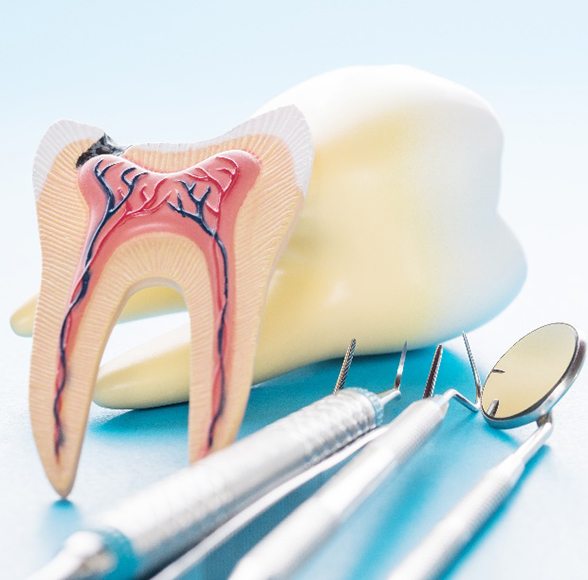Root Canal Therapy – Williamstown, NJ
Give Your Tooth Another Chance
When structural damage or decay is so severe that bacteria are able to reach the inner chamber of the tooth, patients can find themselves faced with the threat of extraction. Thankfully, Dr. Wael Kassem offers a much better alternative: root canal therapy. While the words “root canal” may send a chill through your heart, the truth is that with today’s advanced tools and anesthetic, the procedure is no more uncomfortable than getting a common filling. Better yet, our modern dental office space offers all the amenities you need to feel comfortable and at ease while we work on your tooth. Once your root canal therapy in Williamstown, NJ is over, you’ll still be able to enjoy your complete, beautiful smile!
Why Choose iSmile Dental Arts for Root Canal Therapy?
- Highly Experienced Dentist Performing Care
- Same-Day Dental Crowns Available
- Accepts Most Dental Insurance Plans
Do I Need Root Canal Therapy?

Some common signs that you may need root canal therapy include:
- Significant discoloration of a tooth
- Irritated or especially tender gums
- Heightened sensitivity to temperature
- Dental pain that occurs when applying any kind of pressure to a certain tooth
However, it’s important for patients to remember that in many cases, tell-tale symptoms may be unnoticeable to an untrained eye. That’s why we strongly recommend that you attend regular checkups here at iSmile Dental Arts. If it’s been more than six months since your last visit or you’d like to schedule your first appointment, contact our Williamstown, NJ dental office!
The Root Canal Process

Whether we determine you need root canal therapy at your routine checkup or an emergency dental visit, the treatment process always starts by numbing your mouth. If you’re anxious, we can also provide you with nitrous oxide sedation. That way, you stay calm and comfortable throughout your time in the treatment chair.
Once we confirm you are ready to begin, Dr. Kassem will start the procedure. First, he will carefully access the inside of the affected tooth, removing diseased pulp and bacteria in the process. Then, we will replace it with a biocompatible substance and seal the area thoroughly to prevent future infection. In most cases, a customized dental crown will also be needed so that the structure of the tooth is seamlessly restored.
The Benefits of Getting a Root Canal

Although the reputation is somewhat scary, the reality of root canal therapy is much more pleasant. In fact, it’s actually good news; it means your tooth can be saved. Furthermore, root canal therapy has a very high rate of success, and many treated teeth go on to last for the rest of the patient’s life, as long as they’re cared for with diligent checkups and oral hygiene. Plus, the restorations used are so lifelike that you may even have a hard time telling which tooth was treated!
Understanding the Cost of Root Canals

The cost of root canal therapy depends on a few factors. During your consultation, we can share specific numbers with you. We will also tell you about payment options, including insurance, financing, and our convenient in-house savings plan. Remember, root canal treatment is an investment that can preserve your smile and save you money in the long run!
Factors That Can Affect Root Canal Cost

A few factors that may affect the cost of your care include:
- The specific tooth that requires treatment. It is more difficult to perform root canal therapy on back teeth (molars and premolars), so they may incur higher fees.
- The overall complexity of the case. We can handle most root canal treatments in our office. In some cases, though, we might need to send you to a specialist, which could lead to a greater overall cost.
- Additional services. Sedation during your procedure, as well as placing a crown afterward, can add significantly to the total cost of your care.
Is It Cheaper to Pull My Tooth?

The upfront cost of a tooth extraction is less than that of root canal therapy. However, it is important to think about the long-term financial considerations of each treatment. Root canal therapy is often a one-and-done treatment. After your crown is placed, you may enjoy lifelong function from your treated tooth! On the other hand, if you remove your damaged tooth, you should pay to replace it. Otherwise, you may end up with costly dental problems down the road, possibly including additional tooth loss! It is often more economical to get root canal therapy.
Does Dental Insurance Cover Root Canals?

It is common for dental insurance policies to cover root canal therapy. The treatment may be classified as a minor or major service, so it may be anywhere from 50% to 80% covered. Our team welcomes insurance, and we are in-network with many popular plans, including Delta Dental, MetLife, and more. We will be happy to help you figure out how your benefits apply and file claims on your behalf.
Other Options for Making Root Canal Therapy Affordable

Outside of insurance, there are a couple of provisions that might make it easier to afford your root canal therapy:
- If you do not wish to pay for the entirety of your treatment upfront, ask us how you can apply for CareCredit. The application process is fast, and most patients are deemed eligible for a low-interest or no-interest installment plan that fits within their budget.
- In-house savings plan. Our in-house savings plan includes preventive care, one emergency exam per year, and a 30% discount on most of the procedures we perform in-house, including root canal therapy. Signing up is easy, and you can start using your benefits right away!
Would you like to learn more about root canal therapy and its cost? Get in touch with the team at iSmile Dental Arts today!
Root Canal FAQs
Why Do I Need a Root Canal If My Tooth Stopped Hurting?
If the throbbing pain stemming from your tooth seemingly disappeared overnight, it’s not because the infection is gone. Quite the opposite; it’s likely because the infection has progressed to the point where it “killed” the nerve. Although you won’t be able to feel anything anymore, it’s only a matter of time until the infection spreads, negatively impacting your oral health even further. That’s why we recommend moving forward with root canal treatment, even if your tooth stopped hurting.
Are Root Canals Preventable?
Yes, you can dramatically reduce your chances of needing root canal treatment by committing to good oral hygiene habits. That starts at home with consistent brushing and flossing. You should also wear a mouthguard when playing sports, keep foods and drinks with added sugar to a minimum, and quit using tobacco products. It’s crucial that you visit us twice a year for a dental checkup as well. These routine visits ensure that cavities are detected and treated before a root canal is necessary.
Is There Anything I Should Do Before My Root Canal?
There are a few things we recommend doing, starting with eating a healthy, well-balanced meal the morning of your procedure (unless otherwise instructed by Dr. Kassem). We also recommend making sure you have everything you need beforehand, including OTC pain medication and soft foods, so you don’t have to go to the store after your appointment. The day of your root canal, choose something comfortable to wear, wear your glasses instead of contacts, and have someone drive you to and from your appointment if you’re being sedated.
How Much Pain Is Normal After a Root Canal?
When you leave our office, you likely won’t feel anything because your mouth will still be numb. As you begin to regain sensation, it’s normal to feel soreness, sensitivity, and discomfort. To combat that, we recommend taking OTC pain medication as directed, rinsing periodically with warm saltwater, and avoiding crunchy, sugary, and acidic foods. Using a cold compress for 10 minutes at a time and keeping your head elevated while you sleep will help as well.
Is There a Way to Make Root Canal Treatment More Affordable?
Yes, there is! To start, many dental insurance providers cover a portion of the cost. So, if you are insured, take a look at the fine print on your plan to see if you have any available benefits and if there are any restrictions, like waiting periods.
If you are uninsured, then ask us about the other financial solutions available to you! At our Williamstown dental office, we have an in-house membership plan, which comes with a significant discount on treatments completed at our office. We also welcome flexible financing with CareCredit, so you can break down the price of your root canal into smaller, more budget-friendly chunks.




